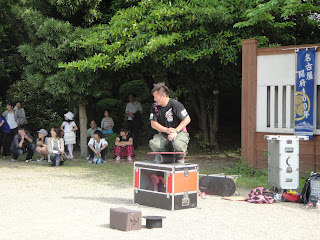
During the bulk of Golden Week I traveled to the city of Nagoya in Aichi prefecture. The city lies not too far away from Kobe; by normal train, it's about 3 hours, which is a steal in terms of price compared to paying double for a bullet train ride.
I went to Nagoya to visit an old friend. As I was under the care of this friend I didn't have the time to strike out on my own to see the city. It's really hard to describe my experience there as I didn't stay long enough to get a feel for the city, and my experiences there weren't really cultural. But I will do my best to make sense out of what I experie
nced there in terms of the city.
There were three good events that gave a cultural experience, two in terms of modern Japanese life and one in terms of Japanese history.
The first location that I speak of was a large park in Nagoya, the name of which escapes me (I'll tell you if I find it), which held a large festival featuring live music and DJs. In spite of how it's described, there wasn't a whole lot going on... two stages and the amount of concession stands outnumbered the musical acts and the people in attendance. Again, I don't exactly know what this festival was for, but there were Japanese people of all ages there. It was slightly reminiscent of something that would be at Evergreen: large, open, green space and lots of hippies. Japanese hippies. The DJ played some fast-paced dance music that was almost self-parodical, and the people dancing to it certainly weren't holding back. Aside from the DJ there were various other acts that came to the more dance-oriented stage.

There was another stage that featured more rock and psychedelia. I mainly experienced the latter genre at this stage. It was truly bizarre and amazing to see a 60s-style Japanese acid rock band play with Japanese girls on each side of the stage in hippie attire, grooving along to the music as if on an LSD trip (although too well choreographed to be anything authentic).
And so, that was pretty much all of that. It was interesting to see Japanese people gather around for something like that. I had a similar cultural experience in China at the Strawberry Music Festival. Everyone enjoyed themselves with a free spirit, and it was definitely an event where people could relax and be themselves.

The second place of significance was also music-related. I went to a Japanese night club for the first time. It was a decent-sized venue on the basement level of a building complex. The event at the club was hip-hop/funk oriented, and there were some incredible mixes. The DJs that spun sets were mostly foreign, though. Regardless of this, the reaction from the nearly entirely Japanese crowd was a trip. Every time a recognizable 80s hip-hop song came on in a mix (Slick Rick, for example) there would be a huge crowd reaction. One DJ, a large, dread-locked African-American who sang along with the set he was spinning (featuring the F-word numerous times, a true Japanese crowd-pleaser), made a particularly big impact. He could clearly feel the love from the listeners as he left, giving fist-bumps to the excited Japanese shouting random American slang. Truly the reverence for American culture, particularly African-American culture, runs strong in the Japanese. It speaks entirely to the impact of American pop culture on modern Japan. As the people at the club were almost entirely Japanese and the event itself was well-done, it was both enthralling and educational to modern Japanese culture. Clubs are a good space to observe how people behave in order to relax or be social with others. I will make sure to visit more during my stay in Japan.

The last place of significance was Nagoya Castle. This castle, destroyed in World War II and reconstructed afterward, was originally home to a branch of the Tokugawa family before the Meiji restoration period. Seemingly, it's the main attraction of Nagoya. I've been to smaller places, so I can't complain.
There was a great performer at the end in the castle area. A lot of his humor didn't seem to hit the mark with the crowd, however. He through things up in the air and caught them.
And then I left Nagoya, and that was how I spent Golden Week. The club was good. Overall it was a nice little city. The end.











